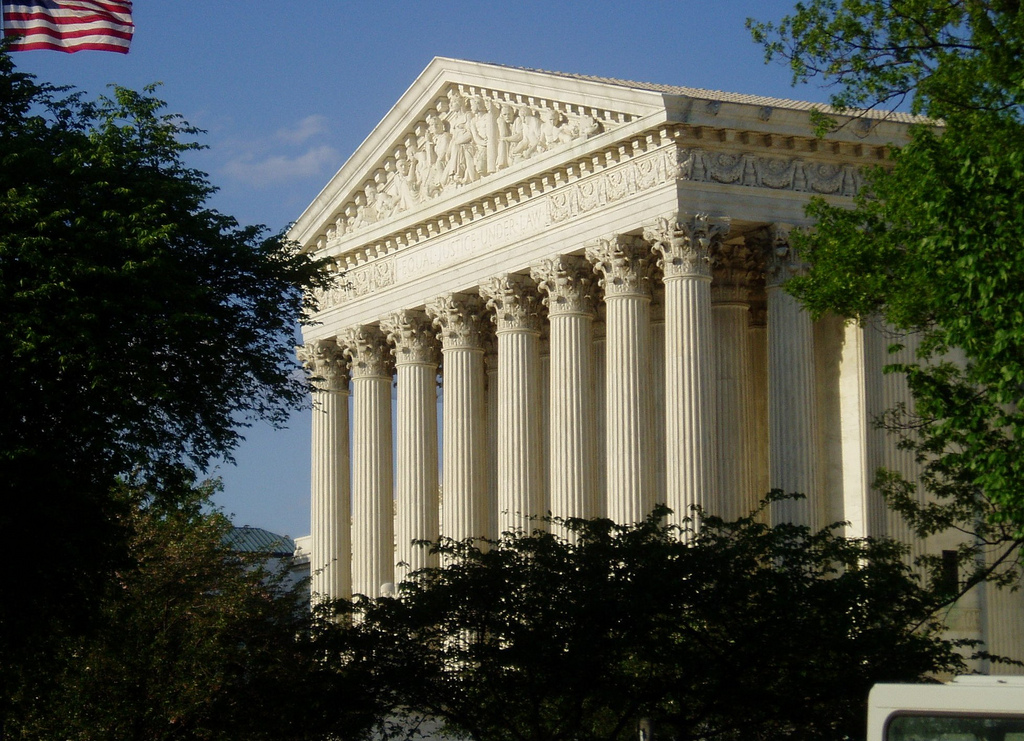Should the United States Supreme Court Be Abolished?
This article has a set of discussion questions tailored for classroom use. Click here to download them. To see a full list of articles with discussion questions and other resources, visit our “Educational Resources” page.
The Supreme Court is back at the forefront of political debate given the recent string of contentious decisions affecting key parts of the President’s political agenda (the Travel Ban), the culture wars (Masterpiece Cakeshop), and the labor movement (Janus). Even more, the recent announcement of Justice Kennedy’s retirement means that the Supreme Court’s ideological balance is likely to sway further to the right — and it may stay that way for some time, given the justices’ lifetime appointments. This makes landmark decisions such as Roe V. Wade vulnerable to being overturned. The time seems ripe for reflection on the moral and political justification for having a Supreme Court with its ultimate power of judicial review. Is this institution so undemocratic that it ought to be abolished in favor of majoritarian procedures for deciding the thorniest social issues of the day?
Arguments against the Supreme Court point out that it routinely — and by design — is asked to decide on fundamental issues concerning the nature of political equality, the basic rights of individual citizens, and the reach of governmental power. The United States Constitution and the laws passed by Congress do not often, if ever, provide clear guidance for how to decide on the cases brought before the Court. In the absence of such clear guidance, the Supreme Court Justices rely (implicitly or explicitly) on their political views to decide cases. This is practically unavoidable. Eric Posner and Glen Weyl describe it thus: “Strip away the legal jargon and most Supreme Court cases are about balancing the interests of two sets of voters.”
Our current Chief Justice, John Roberts, memorably claimed during his confirmation hearings: “If I am confirmed, I will confront every case with an open mind. I will fully and fairly analyze the legal arguments that are presented. I will be open to the considered views of my colleagues on the bench. And I will decide every case based on the record, according to the rule of law, without fear or favor, to the best of my ability. And I will remember that it’s my job to call balls and strikes and not to pitch or bat.” The actual record of the Court does not suggest he’s been successful in upholding his vision of the job. No doubt, there have been plenty of decisions that are not split 5-4, conservatives versus the liberals. However, many of the most politically fraught decisions are split this way. The fairest way to make political decisions is by means of the democratic process. Thus, the Supreme Court should be made more democratic. Judges should be elected or should be term limited. More radically, judicial decisions should be subject to overruling by regular acts of the legislature, not only by constitutional amendments that must meet a much higher bar.
One can and should question the above argument’s presumption that judicial decisions are necessarily political. This is certainly not a considered view held by everyone. But, let us consider other positive arguments: can the Court have the power of absolute judicial review in a democratic society? Many have argued that the Supreme Court has made our society more just than it otherwise would have been were we to have invested ultimate power in a democratic legislature. Judges are more likely to protect minority rights, as they are not subject to the political influence that majorities can exert on representatives through their fear of losing re-election. Judges are more apt to provide stability over time in the application of laws than are democratic legislature subject to the passing whims of the general society. In short, judicial review has a better chance of ensuring a just society that protects the rights of everyone in an impartial manner. Though we may value democracy as a political ideal, other values (freedom and individual rights) are as important to a just society.
Legal philosopher Ronald Dworkin argues that the judicial review of the U.S. Supreme Court can also enhance public debate. Citizen engagement through deliberation of importance political issues of is seen as a marker of a healthy democracy. A society where citizens do not care about, are not knowledgeable about, and do not engage in respectful debate about important issues is a society where democracy is on the wane. Institutions like the Supreme Court help refine the character of debate about important social topics because they focus the questions on issues of political principal and morality. When social issues are left to democratically elected legislatures, issues get drenched in the mud-slinging and hyperbolic rhetoric that may help turn out base voters, but do not help people get any clearer on the rational considerations of an issue.
Further, Dworkin argues, courts can make decisions that protect or enhance democratic rights (the right to vote, to express oneself freely, to assemble, etc.), just as legislatures can democratically enact legislation that harms democratic rights. Legislatures can, for example, enact voting laws that outright deny some class of people the right to vote or merely make it much harder for certain classes of people to exercise their right to vote. Whether or not the courts or the legislature are more likely to protect democracy is an empirical question. However, these considerations undercut the notion that assigning power to the court necessarily undercuts democratic norms.
As arguments are put forth concerning the justification and alleged political character of the Supreme Court, it is worth remembering that there is nothing necessary about having one. The political system of the United Kingdom vests ultimate power in the British Parliament. Moreover, the power of ultimate judicial review invested in the US Supreme Court is not clearly stated in the Constitution, but rather evolved through a series of decisions made by the Supreme Court itself (see Marbury v. Madison).
[Characterizations of Ronald Dworkin’s arguments above are owed to Jeremy Waldron’s Law and Disagreement (1999, Oxford University Press).]





